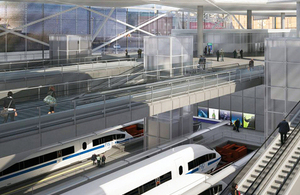PM and Chancellor give green light to develop HS3
The rail link is part of a radical plan to improve transport in the north: the proposals will be key in creating a northern powerhouse.

As part of the government’s long term economic plan for the north, the Prime Minister and Chancellor today gave their backing to develop HS3 – a high speed rail link connecting the north’s great cities which could significantly reduce journey times across the region.
The Prime Minister and the Chancellor were responding to a report published by HS2 Chairman Sir David Higgins which sets out proposals for how to maximise the benefits of HS2 in the north and how transport links can be improved in the north of England more widely.
In the report, Sir David identifies the vital importance of improving east west connectivity across the north and considers the central role a high speed rail link could play. He concludes that with a high speed link the journey time between Leeds and Manchester could be cut from around 55 to between 26 and 34 minutes.
The Prime Minister and the Chancellor have also welcomed Sir David Higgins’ recommendation that co-operation on transport issues should be formalised in the north. In response the Chancellor announced the creation of a new body called Transport for the North made up of the main northern city regions. This body will work together with other authorities and stakeholders and allow the north to speak with one voice on the big decisions to benefit the region as a whole.
The government, working with Transport for the North, will now produce a comprehensive transport strategy for the region. This will include options, costs and a delivery timetable for a HS3 east west rail connection. An interim report will be produced next March.
By combining the strengths of the north’s great cities, the government believes that the proposals will help transform the economy of the north of England and play a key role in delivering a northern powerhouse.
The government is also launching a review into the costs and time it takes to build high speed rail, drawing on international experience to find ways to bring down the costs of Phase Two and future high speed rail projects.
The report from Sir David Higgins also gives strong backing to the case for Phase Two of HS2 and sets out proposals to maximise its benefits. His proposals include bringing forward plans for a hub station at Crewe to 2027 and a fundamental review of the right solution for Leeds station to allow connections between HS2, existing rail services and improved east west connections. The government will set out its detailed plans for Phase Two in 2015.
Prime Minister David Cameron said:
Improving connectivity and reducing journey times between our great northern cities is a crucial part of our long term economic plan for the north to boost businesses and create more jobs and security for hardworking people. That’s why we are backing HS3.
I welcome Sir David Higgins’ report which will help our work to create a northern powerhouse and ensure that HS2 delivers the maximum economic benefits.
Chancellor George Osborne said:
The vision I set out earlier this year of the northern powerhouse we could build is rapidly taking shape. I asked Sir David Higgins to look at how we deliver the better transport links across the north that would make a reality of that powerhouse.
I’m delighted with the rapid response and the report. Today we take another big step forward in delivering both the HS2 links from north to south and the HS3 link across the Pennines.
On the back of new transport infrastructure, science investment and civic leadership we are well on our way to turning the Northern Powerhouse into reality.
Transport Secretary Patrick McLoughlin said:
Our northern cities are on the brink of an economic transformation and today’s report underlines how we can secure this by bringing those cities together to maximise the benefits of good transport links.
HS2 is crucial to this, and I welcome Sir David’s findings on how we can ensure the phase two route delivers maximum economic benefits throughout the midlands and the north. But as he says, it is only through linking the east and west of the region that we can really unlock these benefits, not just along the route itself but right across the north.
We have already made great progress towards starting work on this vital project, and I will now give further consideration to Sir David’s comments.
Chief Secretary to the Treasury Danny Alexander said:
We owe it to taxpayers to make sure the benefits of these projects are maximised and the costs are tightly controlled. Today’s report shows how better transport links will help unleash the north’s tremendous potential for growth which will benefit the whole of the UK.
We have asked Sir David to do some important further work on how to maximise the significant benefits HS2 will bring to Scotland. It is also essential that this project is delivered as cost effectively as possible, which is why we are doing further work to see how international best practice can reduce costs.
“As I said when I launched the National Infrastructure Plan, excellent infrastructure is essential if we are to build a stronger economy and fairer society. And to deliver world class infrastructure requires that as a nation, we ‘think big’. That is exactly what David Higgins has done in his report.”
Notes to editors
The Chancellor asked Sir David Higgins to consider how to address poor east-west transport links in the north in June this year. This call for a new high speed rail link across the Pennines was also backed by the One North report by northern city authorities in August.
The proposals announced today are the latest in a series of initiatives across a range of sectors to deliver a northern powerhouse.